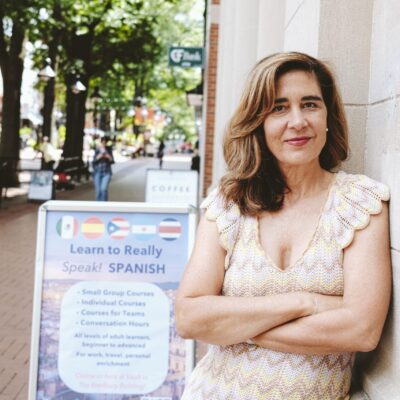One month ago, the Rivanna Water & Sewer Authority (RWSA) was poised to launch a study of two plans for expanding the Rivanna pump station, which transports sewage to the Moore’s Creek Wastewater Treatment Plant. The first would keep the sewage pump in the Woolen Mills residential neighborhood and near the foot of Riverview Park at a cost of $25 million. The second, favored by Charlottesville City Council, would relocate the facility east across the Rivanna River into Albemarle County, near State Farm Insurance, for $34 million.
|
Councilor David Brown (below, left) cast the lone city vote to study a $37 million Rivanna pump station, downriver from the current site (pictured above in a rendering). City Manager Maurice Jones abstained and said that he was required to vote with the majority of City Council; Brown replied, “But I don’t work for Council.” |
But after a private meeting attended by City Councilor David Brown, two RWSA officials, and select Woolen Mills residents, the RWSA Board of Directors authorized a study for the $37 million “Concept C” as its preferred option. Concept C—previously cited as an “extremely difficult” construction project, and requiring the longest time to implement—would move the pump station downstream from the current Woolen Mills site, near a new group of property owners.
Now, facing strict state deadlines for expanding the pump station, RWSA officials may also have to answer to Woolen Mills residents who feel they were left out of a clandestine meeting. The night before the RWSA vote, Brown met with RWSA board chair Mike Gaffney, RWSA Executive Director Tom Frederick, and a few Woolen Mills residents in their neighborhood.
“Being able to stand there and see the scale of what was being asked there…was really helpful to the process,” says Brown. The small number of attendees, he adds, was “the extent of how many we could invite without it being a public meeting,” as defined by Virginia’s Freedom of Information Act.
Not included in the meeting? Victoria Dunham, president of the Woolen Mills Neighborhood Association, who said many of her neighbors have sought “a spirit of openness and transparency” in the city, and consider Concept C to be unacceptable.
“Up until now, we’ve had a process,” says Dunham. “Then, all of a sudden, the process completely disappeared.”
Due to the cost and construction challenges, Dunham assumed that Concept C “was off the table entirely.” Residents who live near the potential site have not attended recent meetings, she says, because they did not think they would be affected.
Brown favors Concept C because it moves the pump station to property owned by the RWSA.
“It’s not located in Woolen Mills, and it’s not located on the State Farm property—it’s located on Rivanna property,” says Brown. “I think that the issues in the Woolen Mills neighborhood make me understand why State Farm is not interested in having a facility down the hill.”
/David_Brown_KOLLAR.jpg) |
Brown adds that State Farm’s concerns likely helped county officials understand the worries of Woolen Mills residents. Both Albemarle County Supervisor Ken Boyd and County Executive Thomas Foley voted in favor. Boyd, who last year passed a six-point action plan that named economic development the “top fiscal priority for Albemarle,” tells C-VILLE that Concept C best honored the spirit of his plan.
“That is why I proposed to study it as a primary solution,” he says via e-mail.
Which may also make Concept C the only solution. In late March, the Virginia Department of Environmental Quality (DEQ) slapped the RWSA, Charlottesville, and the Albemarle County Service Authority with orders to stop the flow of polluted water into the Rivanna River. During the last five years, DEQ received reports of wastewater discharges into Moore’s Creek, Meadow Creek and Schenk’s Branch, caused by heavy rain that overwhelmed infrastructure. Improvements to the Rivanna pump station would more than double its peak wet weather capacity.
The DEQ letters include a two-year schedule of improvements, culminating in the April 2013 completion of upgrades to the Moore’s Creek Wastewater Treatment Plant. As part of the consent orders, the RWSA must select a plan for the Rivanna pump station expansion by December—a deadline that Frederick says the RWSA can’t afford to miss.
Councilor Brown concurred during the meeting. “Given our time frame, it’s hard to construe we’re not voting for C,” he said. Charlottesville City Council planned to discuss Concept C during its Monday night meeting, and will vote on its preferred concept on May 16.
/RWSA-perspective5.jpg)





